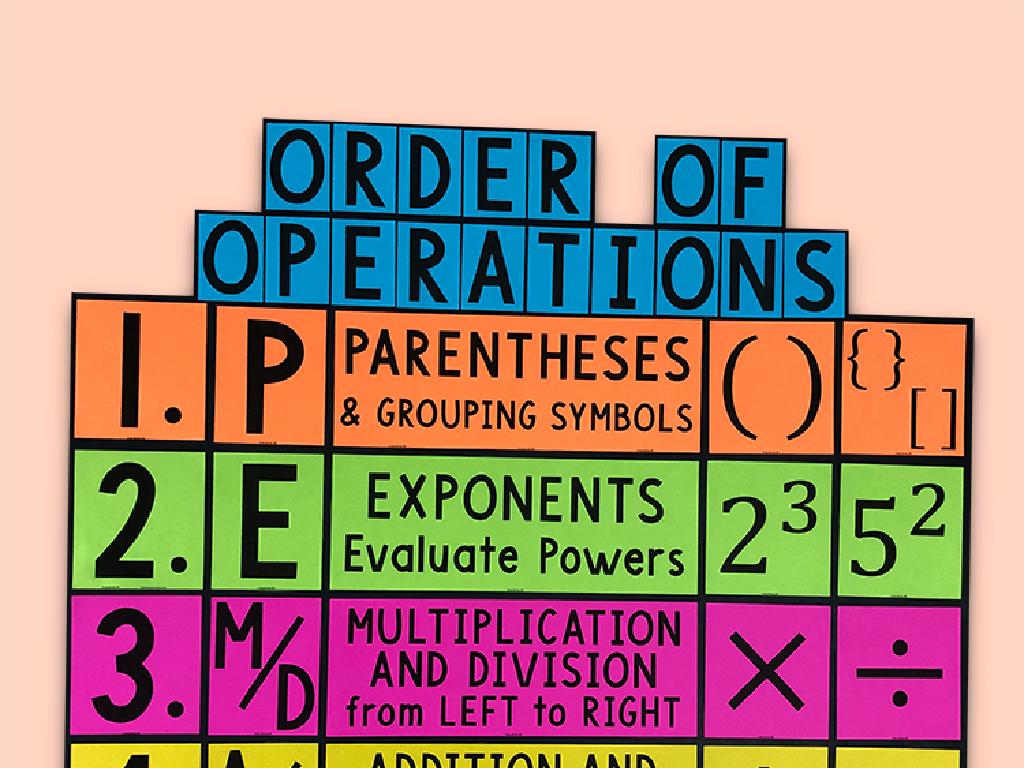Use The Meanings Of Words As Clues To The Meanings Of Greek And Latin Roots
Subject: Language arts
Grade: Fourth grade
Topic: Greek And Latin Roots
Please LOG IN to download the presentation. Access is available to registered users only.
View More Content
Unlocking Word Secrets with Greek and Latin Roots
– Discover word building blocks
– Learn how roots form English words
– Many English words are made from Greek and Latin word parts.
– Understand roots to guess meanings
– Knowing roots helps us deduce the meaning of new words we encounter.
– Roots help with unfamiliar words
|
This slide introduces students to the concept of Greek and Latin roots, the fundamental elements that form a large number of English words. By understanding these roots, students can become word detectives, using their knowledge to unlock the meaning of unfamiliar words. This foundational skill will aid in vocabulary development and reading comprehension. Encourage students to think of words as puzzles that can be pieced together by recognizing these common roots. Provide examples such as ‘bio’ meaning life in Greek, as in ‘biology’, the study of life. Emphasize that a strong grasp of these roots can make learning new words easier and more fun.
Exploring Word Roots
– Roots: the word’s foundation
– Like a plant’s roots give it support, a word’s root is its base part.
– Greek & Latin roots in English
– Many English words come from Greek and Latin roots.
– Examples: roots in words
– ‘Tele’ in telephone, ‘graph’ in photograph.
– Understanding roots helps vocabulary
– Knowing roots helps us figure out the meanings of new words.
|
This slide introduces the concept of roots in words, focusing on Greek and Latin origins which are prevalent in the English language. Begin by explaining that roots are the base part of words, similar to how roots support a plant. Provide examples of Greek and Latin roots found in common English words, such as ‘tele’ meaning ‘far’ in ‘telephone’ or ‘graph’ meaning ‘writing’ in ‘photograph’. Emphasize how understanding these root words can help students deduce the meaning of new vocabulary. Encourage students to think of other words they know that might contain these or other roots. This foundational knowledge will aid in their language arts development and enhance their comprehension skills.
Discovering Meanings with Greek and Latin Roots
– Roots as clues to meaning
– ‘Roots’ hint at word definitions
– Activity: Meaning of ‘telegraph’
– Using ‘tele-‘ let’s guess ‘telegraph’s’ meaning
– ‘tele-‘ means ‘distance’
– Can you think of other ‘tele-‘ words?
|
This slide introduces students to the concept of using Greek and Latin roots to decipher the meanings of unfamiliar words. Explain that roots are the basic parts of words that carry meaning. For the activity, guide students to use the root ‘tele-‘ to infer that ‘telegraph’ has something to do with communicating over a distance. Encourage them to think of other words with the root ‘tele-‘ like ‘television’ or ‘telephone’ and discuss what these words have in common. This activity will help students understand how a root can give insight into the meaning of a word and enhance their vocabulary skills.
Exploring Greek Roots: ‘bio’ and ‘phon’
– ‘bio’ means life
– ‘bio’ as in ‘biography’ means a life story
– ‘phon’ means sound
– ‘phon’ as in ‘symphony’ means a harmony of sounds
– Match roots with meanings
– Examples: biography, symphony
– ‘bio’ + ‘graphy’ = life writing; ‘sym’ + ‘phony’ = sounds together
|
This slide introduces students to the concept of Greek roots in English words, focusing on ‘bio’ and ‘phon’. ‘Bio’ is a root that means ‘life’, found in words like ‘biology’ (the study of life) and ‘biography’ (a written account of someone’s life). ‘Phon’ means ‘sound’, and is seen in words like ‘symphony’ (a musical composition) and ‘telephone’ (a device for sound from far away). The activity encourages students to match Greek roots to their meanings, reinforcing their understanding of how roots give clues to word meanings. For the activity, provide a list of words with Greek roots and their definitions for students to match. This interactive element will help solidify their grasp of the material.
Exploring Latin Roots: ‘aqua’ and ‘scribe’
– ‘aqua’ means water
– Like ‘aquarium’ where fish live in water
– ‘scribe’ means write
– ‘Describe’ is to write down what something is like
– Create words with Latin roots
– Share your new words
|
This slide introduces students to the concept of Latin roots in English words. ‘Aqua’ and ‘scribe’ are common roots that can help students deduce the meaning of new words they encounter. For the activity, students will use their creativity to combine different Latin roots to create new words and then explain what they think those words would mean. This exercise will enhance their understanding of word formation and etymology. Teachers should encourage students to think about other words they know that include these roots. Possible activities: 1) Match Latin roots to their meanings, 2) Find words in a story that have Latin roots, 3) Draw pictures of what their new words might mean, 4) Write sentences using the new words they create.
Using Roots to Understand New Words
– Steps to decode new words
– Find the root in the word
– ‘Root’ is a part of the word that holds the basic meaning.
– Guess meaning from the root
– If ‘geo-‘ means earth, what could ‘geology’ mean?
– Activity: Decode ‘geology’
– Let’s break down ‘geology’ using ‘geo-‘ for earth and ‘-logy’ for study.
|
This slide is aimed at teaching students how to use their knowledge of Greek and Latin roots to decode unfamiliar words. Start by explaining the steps to identify and use word roots. Emphasize that a root can give important clues about a word’s meaning. For the activity, guide the students to understand that ‘geo-‘ is a Greek root meaning ‘earth.’ Ask them to use this knowledge to infer the meaning of ‘geology.’ Explain that ‘geology’ is the study of the earth, combining ‘geo-‘ with ‘-logy,’ which means the study of something. Encourage students to think of other words with the root ‘geo-‘ and discuss their meanings. This activity will help reinforce the concept of roots and their importance in understanding vocabulary.
Practice Time: Greek and Latin Roots Game
– Play a matching game with roots
– Connect roots to their meanings
– For example, ‘bio’ means life, as in ‘biology’
– Decode new words using roots
– Use roots like ‘tele’ (far) to understand ‘telescope’
– Share your discoveries with the class
|
This slide introduces a classroom activity designed to reinforce the students’ understanding of Greek and Latin roots. The matching game will involve students connecting root words to their meanings, which will help solidify their understanding of how roots form the basis of many English words. Encourage students to use the roots they’ve learned to decode unfamiliar words, promoting critical thinking and problem-solving skills. After the game, have students share the new words they’ve decoded and discuss the roots that helped them. This will not only help with retention but also allow students to learn from each other. Possible activities include matching cards, root word bingo, or a ‘root word hunt’ where students find words in their reading that contain Greek or Latin roots.
Class Activity: Root Word Exploration
– Pick a Greek or Latin root
– List words with this root
– Find words in books or brainstorm with family
– Discuss meanings with classmates
– How does the root change the meaning of each word?
– Homework: Craft a root-rich story
– Include five words with roots in a creative story
|
This activity is designed to help students recognize and understand the influence of Greek and Latin roots on the English language. Start by explaining what a root word is and provide examples of Greek and Latin roots. Encourage students to choose one root and brainstorm as many words as they can that include this root. Facilitate a class discussion where students share their words and explain the meanings, highlighting how the root contributes to each word’s definition. For homework, assign students to write a short story that incorporates at least five words with Greek or Latin roots, which will help reinforce their understanding of the roots and their ability to recognize and use them in context.





